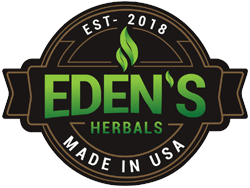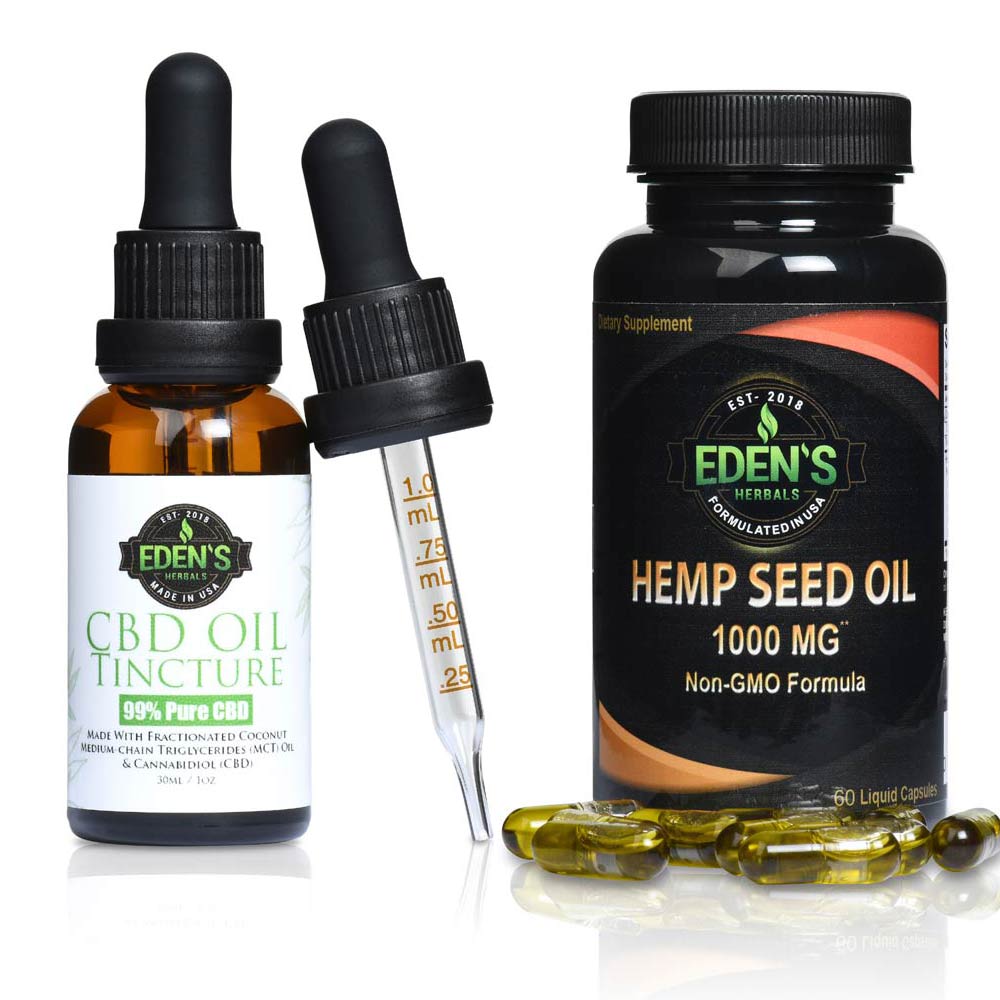
Whether you're new to cannabis or have been an enthusiast for years, new developments when it comes to oils and extracts can sometimes be confusing. In particular, the development and ensuing popularity of CBD oil has taken most of us by storm. You may also have heard about the potential health benefits of hemp seed oil.
So what's the difference? If you don't know, you're not alone. But here, we'll investigate where each oil comes from, what sets them apart, and how each one can impact your life.
Hemp seed oil products have been around for decades. But with hemp-derived CBD oil becoming federally legal, many people are very confused as to the differences between the two.
But to understand the differences between CBD oil and hemp seed oil, we first need to look at where each one comes from. Both extracts come from different varieties of the same plant, Cannabis sativa. If you're familiar at all with marijuana, this plant name probably sounds familiar. The variety of Cannabis sativa used to produce psychoactive marijuana produces 20% THC or greater. THC is one of the best-known cannabinoids, and it's what causes the "high" feeling you get when you smoke marijuana.
On the other hand, Cannabis sativa is found in another variety, which is commonly known as hemp. In order to be legally sold, hemp needs to contain 0.3% or less of THC. This isn't enough to cause psychoactive effects. The industrial hemp plant is also used to produce clothing, rope, and other products. More recently, it's been used to produce sustainable alternatives to wood flooring.
Most CBD oil products you'll find are derived from the hemp plant. Using CO2, a liquid solvent, or (less commonly) an oil extraction method, CBD is removed from the hemp plant. Since hemp plants naturally contain 20% CBD, this extraction process is generally a high-yield one. And with the popularity of CBD oil and related products on the rise, some growers are developing strains with a very high CBD content.
Hemp seed oil is also sourced from hemp plants, although it is only sourced from the seeds. The seeds of the hemp plant are removed, cleaned, and cold-pressed to yield a purified oil. This oil, like CBD, also has a host of health benefits, which we'll discuss in a moment.
While many people mix up hemp plants and marijuana plants (both varieties of Cannabis sativa, as discussed above), the central difference is that marijuana produces a psychoactive high, while hemp does not. Understanding why requires a crash course in cannabinoids, which are natural components in cannabis plants. While newer cannabinoids are still being discovered, two of the best-known cannabinoids are THC (tetrahydrocannabinol) and CBD (cannabidiol). And while THC is the cannabinoid best known for producing a high, any strain of marijuana will also contain some CBD.
However, this doesn't mean CBD causes a high. In fact, naturally-occurring CBD can help offset paranoia and some of the negative effects caused by taking in too much THC. This effect is part of why CBD is often used to help treat anxiety (more on that later). Plus, in most localities and on a federal level, any CBD product that is legal to sell can only be extracted from industrial hemp plants, which have 0.3% THC or less.
Since hemp seed oil is pressed from the seeds of these low-THC plants, it won't cause a high, either. However, like CBD oil, it has several documented health benefits.
While many people tout the benefits of CBD oil and hemp seed oil, not everyone is aware of their specific benefits. As research continues, scientists may be able to uncoverfurthermental health benefits. For now, both CBD users and Scientific studies have made the following mental health benefit claims of both CBD oil and hemp seed oil:
As CBD oil's popularity expands, more research is being done into its potential to improve mental health. Several recent research studies have indicated that CBD oil has the potential to be used as an antidepressant. One of these studies, conducted in 2018, even indicates that CBD could be used as a fast-acting antidepressant.
This is important for a number of reasons. While a few classes of medications, including selective serotonin reuptake inhibitors (SSRIs) and tricyclic antidepressants, are currently prescribed for depression, many of these medications take a period of weeks to work. This often proves difficult, especially for patients whose depression is debilitating. And the difficulties don't stop there--some of the common side effects of antidepressants include the following:
Particularly for someone who is already suffering from severe depression, these side effects can add another layer of difficulty when it comes to getting well. However, in trials, CBD has been shown to have a comparatively low risk of side effects. In most users, it doesn't cause any.
But CBD oil has mental health benefits beyond those for depression. It's been shown in trials to reduce panic and anxiety responses, even in those who don't have a clinically diagnosed disorder. Given its typical lack of side effects and the fact that it's non-impairing, these results are promising, even if you aren't someone who has a clinically diagnosed mental health disorder.
Most of hemp seed oil's benefits come in the form of benefits for physical health. However, as many people are learning, diet plays a significant role in mental health disorders. And since hemp seed oil can be purchased in a culinary form. This oil is especially rich in omega 3 and omega 6 fatty acids, which support lasting brain health. It also is rich in gamma linoleic acid (GLA), which can help reduce inflammatory responses caused by depression. Some experts recommend taking hemp seed oil as a dietary supplement. And since it can be mixed into a smoothie or made into a salad dressing, it's easy to incorporate into everyday life.
Of course, since mental and physical health are, to a degree, intertwined, it should come as no surprise that CBD oil and hemp seed oil also have some positive physical health benefits. Here are some of the benefits you might be able to reap from both.
Much of the discourse around CBD oil points to its positive effects on mental health. However, this unique compound has also been shown to successfully help treat chronic pain. It does this by interacting with the body's endocannabinoid system. Just as cannabinoids are a part of hemp and marijuana plants, the body naturally produces cannabinoids--called endocannabinoids--that help regulate pain response. CBD oil, when dosed appropriately, has been shown to reduce chronic pain by impacting endocannabinoid receptors, interacting with neurotransmitters, and reducing inflammation response. CBD oil isalsoused to treat nausea and vomiting, and this means it may also be used to help alleviate some of the nausea and pain related side effects of cancer treatment.
So what's the difference? If you don't know, you're not alone. But here, we'll investigate where each oil comes from, what sets them apart, and how each one can impact your life.
Starting from the Roots: Where Does CBD Oil and Hemp Oil Come From?
Hemp seed oil products have been around for decades. But with hemp-derived CBD oil becoming federally legal, many people are very confused as to the differences between the two.
But to understand the differences between CBD oil and hemp seed oil, we first need to look at where each one comes from. Both extracts come from different varieties of the same plant, Cannabis sativa. If you're familiar at all with marijuana, this plant name probably sounds familiar. The variety of Cannabis sativa used to produce psychoactive marijuana produces 20% THC or greater. THC is one of the best-known cannabinoids, and it's what causes the "high" feeling you get when you smoke marijuana.
On the other hand, Cannabis sativa is found in another variety, which is commonly known as hemp. In order to be legally sold, hemp needs to contain 0.3% or less of THC. This isn't enough to cause psychoactive effects. The industrial hemp plant is also used to produce clothing, rope, and other products. More recently, it's been used to produce sustainable alternatives to wood flooring.
Most CBD oil products you'll find are derived from the hemp plant. Using CO2, a liquid solvent, or (less commonly) an oil extraction method, CBD is removed from the hemp plant. Since hemp plants naturally contain 20% CBD, this extraction process is generally a high-yield one. And with the popularity of CBD oil and related products on the rise, some growers are developing strains with a very high CBD content.
Hemp seed oil is also sourced from hemp plants, although it is only sourced from the seeds. The seeds of the hemp plant are removed, cleaned, and cold-pressed to yield a purified oil. This oil, like CBD, also has a host of health benefits, which we'll discuss in a moment.
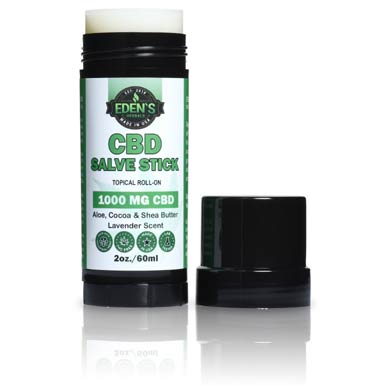 Understanding Cannabinoids: Can CBD or Hemp Seed Oil Get Me High?
Understanding Cannabinoids: Can CBD or Hemp Seed Oil Get Me High?
While many people mix up hemp plants and marijuana plants (both varieties of Cannabis sativa, as discussed above), the central difference is that marijuana produces a psychoactive high, while hemp does not. Understanding why requires a crash course in cannabinoids, which are natural components in cannabis plants. While newer cannabinoids are still being discovered, two of the best-known cannabinoids are THC (tetrahydrocannabinol) and CBD (cannabidiol). And while THC is the cannabinoid best known for producing a high, any strain of marijuana will also contain some CBD.
However, this doesn't mean CBD causes a high. In fact, naturally-occurring CBD can help offset paranoia and some of the negative effects caused by taking in too much THC. This effect is part of why CBD is often used to help treat anxiety (more on that later). Plus, in most localities and on a federal level, any CBD product that is legal to sell can only be extracted from industrial hemp plants, which have 0.3% THC or less.
Since hemp seed oil is pressed from the seeds of these low-THC plants, it won't cause a high, either. However, like CBD oil, it has several documented health benefits.
Mental Health Benefits of CBD Oil and Hemp Seed Oil
While many people tout the benefits of CBD oil and hemp seed oil, not everyone is aware of their specific benefits. As research continues, scientists may be able to uncoverfurthermental health benefits. For now, both CBD users and Scientific studies have made the following mental health benefit claims of both CBD oil and hemp seed oil:
CBD Oil and Mental Health
As CBD oil's popularity expands, more research is being done into its potential to improve mental health. Several recent research studies have indicated that CBD oil has the potential to be used as an antidepressant. One of these studies, conducted in 2018, even indicates that CBD could be used as a fast-acting antidepressant.
This is important for a number of reasons. While a few classes of medications, including selective serotonin reuptake inhibitors (SSRIs) and tricyclic antidepressants, are currently prescribed for depression, many of these medications take a period of weeks to work. This often proves difficult, especially for patients whose depression is debilitating. And the difficulties don't stop there--some of the common side effects of antidepressants include the following:
- fatigue
- sexual dysfunction
- anxiety
- dizziness
- weight gain
- nausea
- dry mouth
Particularly for someone who is already suffering from severe depression, these side effects can add another layer of difficulty when it comes to getting well. However, in trials, CBD has been shown to have a comparatively low risk of side effects. In most users, it doesn't cause any.
But CBD oil has mental health benefits beyond those for depression. It's been shown in trials to reduce panic and anxiety responses, even in those who don't have a clinically diagnosed disorder. Given its typical lack of side effects and the fact that it's non-impairing, these results are promising, even if you aren't someone who has a clinically diagnosed mental health disorder.
Mental Health Benefits of Hemp Seed Oil
Most of hemp seed oil's benefits come in the form of benefits for physical health. However, as many people are learning, diet plays a significant role in mental health disorders. And since hemp seed oil can be purchased in a culinary form. This oil is especially rich in omega 3 and omega 6 fatty acids, which support lasting brain health. It also is rich in gamma linoleic acid (GLA), which can help reduce inflammatory responses caused by depression. Some experts recommend taking hemp seed oil as a dietary supplement. And since it can be mixed into a smoothie or made into a salad dressing, it's easy to incorporate into everyday life.
Physical Health Benefits of CBD and Hemp Seed Oil
Of course, since mental and physical health are, to a degree, intertwined, it should come as no surprise that CBD oil and hemp seed oil also have some positive physical health benefits. Here are some of the benefits you might be able to reap from both.
Physical Health Benefits of CBD Oil
Much of the discourse around CBD oil points to its positive effects on mental health. However, this unique compound has also been shown to successfully help treat chronic pain. It does this by interacting with the body's endocannabinoid system. Just as cannabinoids are a part of hemp and marijuana plants, the body naturally produces cannabinoids--called endocannabinoids--that help regulate pain response. CBD oil, when dosed appropriately, has been shown to reduce chronic pain by impacting endocannabinoid receptors, interacting with neurotransmitters, and reducing inflammation response. CBD oil isalsoused to treat nausea and vomiting, and this means it may also be used to help alleviate some of the nausea and pain related side effects of cancer treatment.
One of the things that makes CBD a potentially great discovery when it comes to physical (and mental) health is that it can be purchased without a prescription, and the fact that it is federally legal makes it more accessible than ever. But there's another benefit--research into CBD's mechanism of action suggests that it isn't habit forming, and that patients who use it have a low to nonexistent chance of becoming addicted. With more and more physicians becoming hesitant or unwilling to prescribe opioids due to dependency risk, CBD oil could potentially help countless people who are looking for a relatively inexpensive, non-addictive solution to treat chronic pain.
Physical Health Benefits of Hemp Seed Oil
If you've ever shopped for hemp seed oil, you already know that it can be used nutritionally or as an ingredient in cosmetics. This unique oil has a host of benefits for overall physical health and for skin health.
Nutritional Benefits of Hemp Seed Oil
As mentioned earlier, hemp seed oil is an excellent source of omega 3 and omega 6 fatty acids. These are part of what are known as healthy fats. When included in moderation in your diet, fats like these can support healthy energy, insulin sensitivity, and even stabilizing heart rhythm. Additionally, hemp seed oil is high in GLA (gamma linoleic acid). This compound has a host of health benefits. It can help you maintain energy and lose weight, and it's also a support for brain and skeletal health. Granted, you can also maintain a healthy GLA intake through dietary choices like eggs and fish. But if you don't regularly consume these things, or if you want an extra boost, it's easy to mix in a tablespoon of hemp seed oil with a drink or meal.
Skin Health Benefits of Hemp Seed Oil
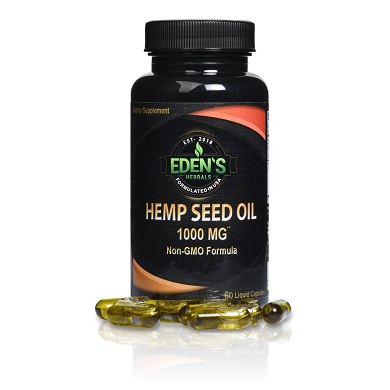
Hemp seed oil can be found in a variety of skincare products, and many of its benefits for the skin are due to its high levels of fatty acids and GLA. And if you're someone with oily or acne-prone skin, hemp seed oil might just be a good skincare choice for you--it has the somewhat unique ability to moisturize and control oil without clogging pores.
Hemp seed oil's high levels of GLA also stimulate generation of new skin cells, which can help keep your skin looking healthy and new. And many of its fatty acids also help to fill wrinkles in the skin, making it a great choice for anti-aging properties. Some studies have also indicated that hemp seed oil can be used to treat a variety of skin conditions, including the following:
- Psoriasis
- Acne rosacea
- Atopic dermatitis
Most people won't experience any negative effects from topical use of hemp seed oil, but as with any natural compound, some reactions are possible. If you're using it for the first time, it's a good idea to test it on a small patch of skin first. Monitor this patch for 24 hours, looking closely for any irritation or redness. If you tolerate it well, it's likely safe to use the hemp seed oil product on the rest of your body.
What are Some of the Products Made from CBD Oil and Hemp Seed Oil?
One benefit of choosing CBD oil, hemp seed oil, or both is that you have the option to take these products in a variety of ways. And whether you intend on using each one occasionally or want to make them part of your daily life, it's helpful to have a variety of ways you can ingest either one.
Ways to Consume CBD Oil
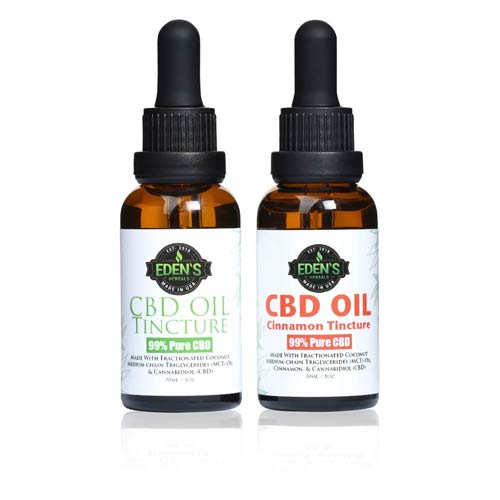
- Tinctures -- A tincture contains CBD oil and, often, a carrier oil like coconut oil or MCT oil. It's usually taken by placing a few drops under the tongue, but some people prefer putting a few drops in tea or other drinks.
- Edibles -- You can find CBD gummies or other edibles for sale in dispensaries or other places where CBD is sold. Alternatively, you can use a tincture or purified CBD oil to make your own edibles.
- Lotions -- Some people claim using a CBD-infused lotion can help relieve aches and pains, as well as give the user a generally relaxed feeling. This may be because CBD can interact with endocannabinoid receptors under the skin.
- Patches -- While this is a less common option, it can offer you an extended, controlled release of CBD throughout the day. This method is useful if you're busy and don't have the opportunity to re-dose as needed.
- Vaporizers -- This is one of the most popular ways to take CBD oil. CBD vape oils are available in a variety of concentrations, making it easier for you to choose one that offers you the right dose.
Ways to Use and Consume Hemp Seed Oil
Especially if you enjoy cooking and trying new things, you can incorporate hemp seed oil into the foods you already eat. Here's how to do it:
- Cooking with hemp seed oil--This is an easy way to incorporate hemp seed oil into daily life. Instead of cooking with olive oil or canola oil, you can simply substitute hemp seed oil. You also can find many recipes for cooking dishes with hemp seed oil.
- Making salad dressings--Many people enjoy making a vinaigrette with hemp seed oil. Alternatively, you can find many recipes online for different types of dressing using hemp seed oil.
- Mixing in with drinks--If you want a simple way of getting your daily dose of hemp seed oil, simply mixing a tablespoon or two into a smoothie, tea, or coffee is a quick option.
- Taking plain oil--This is the most straightforward option available. If you don't mind the oily consistency, you can take a tablespoon or two as a shooter.
- Capsules - Hemp Seed Oil capsules are a fast and effective way to consume hemp seed oil.
If you want to use hemp seed oil as a skincare product, there are also several ways to do so:
- Skin oil--Face and body oils made of hemp seed oil are easy to find at many price points. These highly moisturizing oils can give your skin a healthy glow.
- Lotions and creams--Whether it's a facial cream, hand cream, or even a full-body lotion, these solutions can keep your skin moisturized while also controlling oil.
- Lip balm--Especially in the dry winter months, a hemp oil lip balm can keep your lips healthy and moisturized.
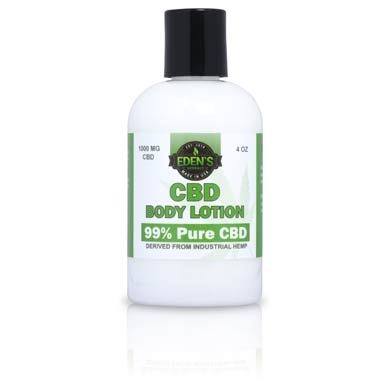 How Can I Make Sure the Products I Choose are Effective?
How Can I Make Sure the Products I Choose are Effective?
Hemp seed oil has long been federally legal, and CBD oil is newly federally legal (as long as it's sourced from industrial hemp plants), but for the average consumer, it's sometimes difficult to know how to find an effective product. For hemp seed oil, purchasing pure oil for cooking or direct consumption is relatively straightforward. However, skincare products vary when it comes to the percentage of hemp seed oil. While a higher concentration of hemp seed oil may increase the benefits you experience, it's still possible to receive great skincare benefits from a product with a lower concentration. When it comes to skincare, it may take some trial and error before you find the ideal concentration for your particular skin issues.
When it comes to CBD oil, finding something effective may be a little more complicated. One of the main complicating factors is that many companies don't list the exact concentration of CBD used. Some manufacturers only list the total cannabinoid content, and this is something to be especially aware of. While THC and CBD are two of the most prominent cannabinoids, there are dozens of other cannabinoids, many of which don't have the health benefits of CBD. If possible, try to purchase products that list the amount of CBD included.
Many respected manufacturers have the contents of tinctures, vape juices, and other products testedto reveal their detailed components. If you can find these products, purchase them--knowing exactly what is in a given CBD oil product will give you a better sense of what works for you. Products like these often list how many milligrams of CBD are in a milliliter of liquid. Experts haven't reached a consensus as to how many milligrams of CBD are needed for an effective dose for a given condition. If you are trying CBD to treat chronic pain, depression, or another condition, you'll likely need to titrate your own dose gradually. If the product you're considering purchasing lists how many milligrams of CBD per milliliter it contains, consider buying one with more milligrams per milliliter. These products are usually more costly than lower-CBD products, but they are more likely to be effective.
Possible Side Effects
One great feature of both hemp seed oil and CBD oil is that neither one usually has significant side effects. However, both can help increase blood flow. While this normally isn't an issue, it can increase the effects of warfarin and other blood thinners. If you're on a blood-thinning medication, it's important to talk to a doctor before use.
CBD oil can also occasionally cause side effects. These are usually mild, and in many cases, users don't experience any side effects. If you start using CBD oil, you might experience dry mouth, lightheadedness, and drowsiness. As with any medication, it's a good idea to start with a low dose and work your way up.
In Conclusion
If you've ever mixed up CBD and hemp seed oil, you aren't alone--misconceptions and even incorrect marketing of these products have confused many. But when you understand the difference between these products, you'll be prepared to purchase the right products to improve mental and physical health. Of course, it's always a good idea to talk to your doctor before adding hemp seed oil or CBD oil to your daily supplement regimen. When you know what to purchase and how to use it, you'll be well on your way to joining the many people who have found relief and new life through these two versatile hemp products.
CBD has not been approved by the FDA to diagnose, treat or cure any illness.All of the articles on this site are written by 3rd party content providers, expert bloggers or Doctors not directly affiliated with Eden's Herbals. Individuals should learn the risks and side effects prior to taking CBD. Talk to your doctor before trying any CBD product.
